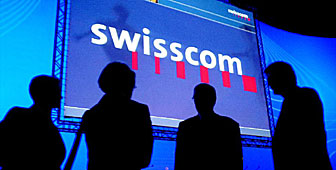Swisscom seeks to preserve “last mile” monopoly

Five years after the liberalisation of the Swiss telecoms market, call costs have fallen dramatically.
But the former state monopoly, Swisscom, is trying to retain its hold on the fixed line network, which competitors see as the primary area for growth in a stagnant market.
Switzerland’s telecommunications market was liberalised in January 1998 amid promises of increased competition and choice.
The ensuing price war between operators sharply reduced call costs, but five years on only two firms have emerged as serious competitors to Swisscom.
Fixed line telecoms is dominated by just two companies – Swisscom and Sunrise – although a few smaller telecom service providers have found niches in the Swiss market.
In the mobile phone market the number of competitors rises to three with Swisscom and Sunrise being joined by France Telecom-owned Orange.
Swisscom dominates
Sunrise, which merged with diAx in early 2001, is 79 per cent owned by the Danish company, TDC, and has nearly 900,000 fixed line telephone users and 522,000 people using its Internet services.
And with over one million mobile phone users, it has snatched second place in the mobile phone market just ahead of Orange, which has 988,000 network users.
But both companies still lag far behind the giant Swisscom, which has 3.5 million customers and is said to be ninth largest company in the European telecom market.
The largest part of the fixed line market still belongs to Swisscom, which accounts for 47 per cent of international calls, 64 per cent of national calls and 80 per cent of local calls.
Unlike Swisscom, Sunrise has yet to make a profit, recording a loss of between SFr400 and SFr450 million in 2001. Orange has only managed profitability since 2001.
Swisscom’s profits – although dipping slightly by 0.8 per cent – reached SFr3.4 billion during the first nine months of 2002. The former state company is also said to hold a war chest of some SFr10 billion.
The last mile
In comparison to the mobile phone networks, fixed line telephone costs have plunged – 70 per cent for international calls and between 30 per cent and 50 per cent for inland calls.
But further decreases are not on the cards due to the fact that Swisscom still runs the last mile – the fixed line telecoms network in Switzerland.
This means that clients of its competitors still need a Swisscom connection even if they use other operators and that Swisscom can still dictate the prices for third party access to its network.
This arrangement also extends to broadband connections. Other telecoms operators complain that the provision of ADSL – by which broadband is conveyed on telephone networks – has been hindered by lack of competition.
Growth market
Switzerland’s telecommunications market is huge for a country of its size. It grew rapidly following liberalisation reaching SFr12.6 billion in 2001 – of which fixed line telecoms and the Internet are worth some SFr6.8 billion.
In 2001, the Swiss spent a whopping SFr2,228 per person on telecoms services.
But the boom seems to be drawing to a close. Sales have reportedly stagnated over the past year, with 75 per cent of Swiss now owning a mobile phone.
Although operators are increasingly trying to entice customers with offers of free phones, the call tariffs remain relatively high.
As a result, the Swiss competition commission has launched an investigation into whether a price-fixing agreement exists between the three main operators.
Pulling no punches
The fight for the last mile is expected to be tough with newcomer Sunrise also hoping for a slice of the broadband pie.
Sunrise is willing to invest millions of francs in broadband but the amount depends on how fast Swisscom allows it access to the last mile and the network.
The Swiss government is promoting the liberalisation process and wants to pass a law to unbundle the last mile in the spring, with the aim of giving access to Swisscom’s competitors.
But Swisscom is fighting the move, calling it a “virtual compulsory purchase”, and has brought its complaint to the Swiss Federal Court. According to the company, the last mile should only be liberalised through law and not because of political expediency.
This situation means that the unbundling of the last mile could go either way in the next few months. It could be done through revision of the radio and television law but this would not happen before 2004, according to the Federal Office of Communications.
Even footing
If Swisscom’s virtual monopoly on the last mile should fall, it would put the company on an equal footing with its opponents.
Due to having an existing telephone infrastructure, Swisscom was able to make a profit of SFr12 billion in the first four years since liberalisation while other telecoms providers in Switzerland have been stumping up cash for investments.
But just how much competition will be opened up by the unbundling of the last mile remains to be seen. A more likely outcome could be that the virtual monopoly is replaced by a duopoly.
swissinfo, Hansjörg Bolliger
Market: SFr12,6 billion (2001)
Fixed line telecoms: Swisscom: 47-80% of market, Sunrise: 842,000 customers
Mobile phone customers: Swisscom: 3.5 miliion, Sunrise: 1,089,000, Orange: 988,000

In compliance with the JTI standards
More: SWI swissinfo.ch certified by the Journalism Trust Initiative











You can find an overview of ongoing debates with our journalists here . Please join us!
If you want to start a conversation about a topic raised in this article or want to report factual errors, email us at english@swissinfo.ch.